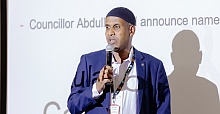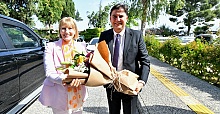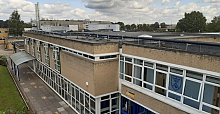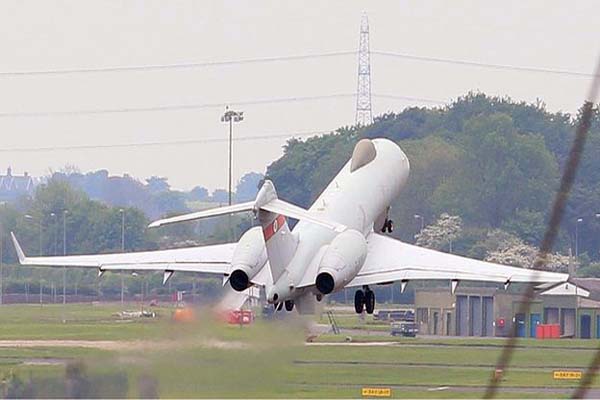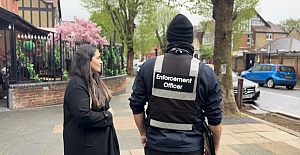Britain has deployed a spy plane as part of humanitarian efforts in Iraq, it has emerged. The disclosure came as reports emerged that at least 80 Yazidi men have been killed and women and children abducted by Islamic State forces, whose mass executions have shocked the world. The Rivet Joint is a reconnaissance aircraft equipped with an array of sensors which are used to pick up electromagnetic signals and determine the locations of people on the ground. It also emerged today that a fresh consignment of British aid has been flown in to Iraqis fleeing the advance of Islamist extremists amid reports of another massacre of religious minorities. The US said its drones had destroyed two armoured vehicles reported by Kurdish leaders as being used by Islamic State (IS) forces to attack civilians near Sinjar. In a signal of the international concern, the United Nations Security Council last night unanimously approved a resolution designed to choke off the terrorists' funding and recruitment. It imposed s anctions including a travel ban and asset freeze on six prominent extremists and warned action could be taken against anyone held responsible for aiding the cause. Sir Mark Lyall Grant, the UK's UN ambassador, said the resolution represented a "comprehensive rejection" of IS.
But he said it was only a first step and urged the international community to be "resolved, active and creative in considering what further measures should be taken to tackle this terrorist scourge".
The vote came after European Union (EU) foreign ministers approved the arming by member states of Kurdish troops trying to resist the extremists' push to expand their sphere of control in Iraq.
Foreign Secretary Philip Hammond said Britain - which has so far only been transporting weapons provided by other countries - stood ready to "consider favourably" any request by Kurdish leaders for it to join countries such as the United States and France by directly supplying military equipment.
The latest delivery of aid, sent from UK stores in Dubai and Gloucestershire, was made up of 8,000 cooking sets for some of the estimated half a million refugees in camps in Dahuk province.
They are aimed at allowing almost 40,000 people to cook for themselves rather than queuing at makeshift canteens in sweltering heat.
International Development Secretary Justine Greening said: "Displaced Iraqi people who have managed to escape Mount Sinjar have walked many miles in searing heat, and now find themselves in camps cut off from their homes and without any possessions.
"They have shown immense courage to get off the mountain and the UK is committed to giving them support. These kitchen sets will enable displaced people to feed themselves and their families."
One Airbus flight set off from Dubai, where the Department for International Development has its main aid stockpile, and another from East Midlands Airport.
The UK has so far committed £13 million in new assistance in response to the crisis in Iraq.
Because it was adopted under Chapter 7 of the UN Charter, military force is authorised to enforce the resolution but Russia has made clear its vote should not be seen as approval of such a move.
Kurdish Peshmerga fighters have been at the forefront of efforts to halt the IS advance and their efforts have been praised for helping thousands of Yazidis flee from Mount Sinjar, where they had been trapped by the jihadists.
But they have complained about being outgunned by IS, leading to the offers of support from western governments.
Mr Hammond said IS represented a threat to civilisation and promised support for any inclusive new administration in Baghdad following the replacement as Iraqi prime minister of Nouri Maliki, who is accused by critics of fuelling sectarianism, helping the rise of IS.
There have been signals from political leaders from the Sunni majority that they could join a government led by new prime minister Haider Abadi.
The chairman of the Commons defence committee Rory Stewart - a former deputy governor of an Iraqi province who is visiting Kurdistan - warned a long-term strategy was needed and that Britain lacked adequate information about the situation.


 Prime Minister Keir Starmer's 2025 Easter message
Prime Minister Keir Starmer's 2025 Easter message After Nesil Caliskan a by-election will be held in Jubilee ward in Enfield
After Nesil Caliskan a by-election will be held in Jubilee ward in Enfield Publishing the analysis, Labour’s Cllr Ergin Erbil said Everybody in Enfield deserves basic rights
Publishing the analysis, Labour’s Cllr Ergin Erbil said Everybody in Enfield deserves basic rights Gaza-Israel conflict Statement from Cllr Ergin Erbil, Leader of Enfield Council
Gaza-Israel conflict Statement from Cllr Ergin Erbil, Leader of Enfield Council UK AMBASSADOR TO TURKEY VISITS FETHIYE
UK AMBASSADOR TO TURKEY VISITS FETHIYE Journalists from Europe held the Turkish Media Workshop in Skopje
Journalists from Europe held the Turkish Media Workshop in Skopje The European Union called on Turkey to uphold democratic values
The European Union called on Turkey to uphold democratic values Turkish citizens in London said Rights, Law, Justice
Turkish citizens in London said Rights, Law, Justice The 'Prince of Paris' has impressed in his first EuroLeague season
The 'Prince of Paris' has impressed in his first EuroLeague season Saran Media And Euroleague Basketball Extend Media Rights Partnership for Four More Years
Saran Media And Euroleague Basketball Extend Media Rights Partnership for Four More Years Will Rangers be Jose Mourinho’s next victim?
Will Rangers be Jose Mourinho’s next victim? Jose Mourinho's Fenerbahce face Rangers on Thursday
Jose Mourinho's Fenerbahce face Rangers on Thursday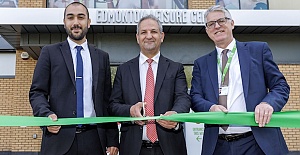 Residents welcomed back to Edmonton Leisure Centre
Residents welcomed back to Edmonton Leisure Centre Barclays has become the biggest UK lender so far to cut mortgage rates
Barclays has become the biggest UK lender so far to cut mortgage rates THE SPRING STATEMENT EXPLAINED, UK ECONOMIC OUTLOOK AND GROWTH FORECASTS
THE SPRING STATEMENT EXPLAINED, UK ECONOMIC OUTLOOK AND GROWTH FORECASTS Launch of Made in Enfield gift shop to celebrate local artists and designers
Launch of Made in Enfield gift shop to celebrate local artists and designers
